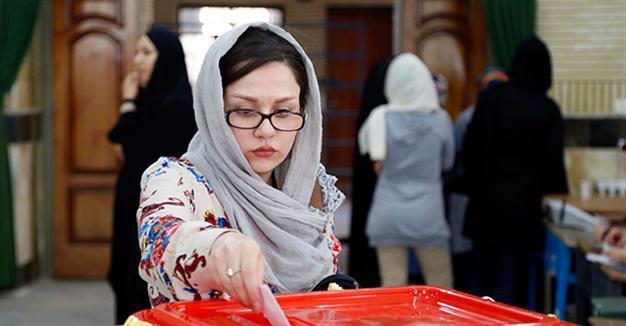Iran’s moderates get most parliament seats after runoff
TEHRAN – The Associated Press

AP photo
Iranian moderates and reformists who support last year’s landmark nuclear deal have won the largest number of seats in parliament following runoff elections, marking a shift away from hard-liners and boosting moderate President Hassan Rouhani as he looks to secure a second term in office.The results released April 30 on state television failed to give the moderate-reformist camp an outright majority in the 290-seat chamber, however. They will now likely try to attract support from dozens of independent lawmakers whose political leanings vary depending on the issue at hand.
There were 68 seats being contested in runoff elections held April 29 in 55 constituencies, where no candidate could take at least 25 percent of the votes in the first round held in February, around the country. Residents in the capital, Tehran, did not take part in the second-round balloting because moderates won all 30 seats there outright in first-round voting in February.
The reformist and moderate list claimed 37 seats in the April 29 vote, giving them a total of 143 seats in the assembly - just two seats shy of 50 percent. They are followed by hard-liners, with 86 seats, and independents, with 61. Twenty-two hard-liners and nine independents won seats in the runoff.
Mohammad Reza Aref, head of the moderate-reformist bloc, welcomed the victory, saying “our priority is engagement with other factions rather than confrontation,” the semi-official ISNA news agency reported.
Tehran-based political analyst Saeed Leilaz called the results a “decisive victory” for the moderate-reformist bloc.
“It is now clear that they are more popular than hard-liners, even in the remote areas,” where their support was seen as lower than in major cities, Leilaz said.
A total of 17 women won seats in both rounds of elections, the largest number ever. At least 11 of them are moderate-reformist. The number of women in the parliament is one more than the number of clerics, which has hit an all-time low.
In the first parliament that followed the Islamic revolution in 1979 there were 164 clerics elected.
The members of the new parliament will be sworn in this month.
Deputy Interior Minister Hossein Ali Amiri told state TV that turnout in the runoff elections was 59 percent, compared with 62 percent in the original February elections. Some 17 million Iranians were eligible to vote.
Iran does not allow international election observers to monitor its polls, which are organized by the Interior Ministry.
Last year’s nuclear deal between Iran and world powers called for curbs designed to prevent Iran from pursuing nuclear weapons in exchange for the easing of painful economic sanctions. Although nuclear-related sanctions have been lifted, other international sanctions remain in place and the deal’s promised economic benefits are only starting to be felt.
Rouhani could enjoy a boost in popularity heading into next year’s presidential elections if the new parliament is seen as delivering on his priorities.
The outgoing parliament, dominated by conservatives and hard-liners wary of Rouhani’s outreach to the West, showed little desire to work with him and frequently summoned ministers to explain alleged transgressions after Rouhani came to power in 2013.
















